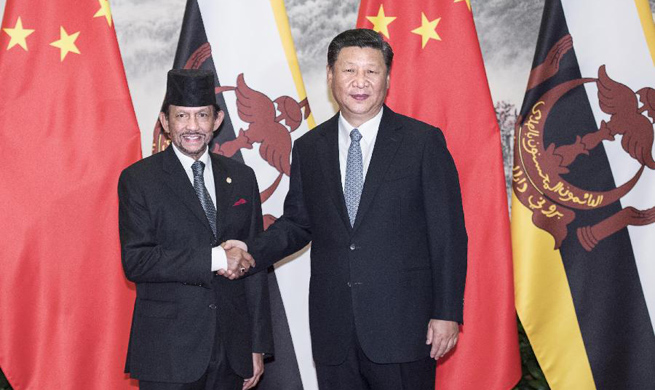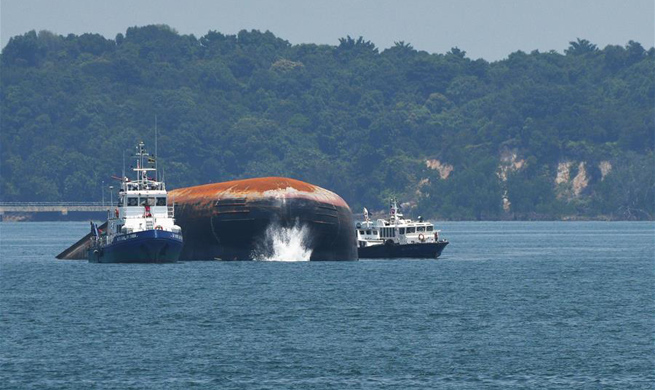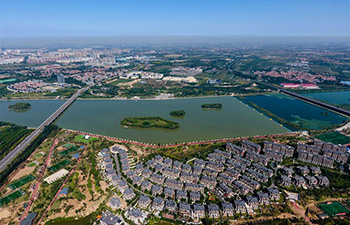BERLIN, Sept. 14 (Xinhua) -- German politicians on Thursday expressed cautious support for Eurozone expansion and reform sketched by European Commission President Jean-Claude Juncker during his state of the union address.
Speaking to public broadcaster ARD, Germany's influential Finance Minister Wolfgang Schaeuble (CDU) said that he shared Juncker's ambition to introduce the European Single Currency, currently used by 19 states, throughout the entire European Union (EU) in principle.
Schaeuble noted, however, that countries could only join the monetary union once they fulfilled the necessary economic criteria. He cited the case of Greece as a warning for what could happen when countries introduced a "hard" currency too early which they could then no longer devalue.
Addressing the European Parliament earlier on Wednesday, Juncker had mapped an ambitious future for the Euro which he said was "destined to become the common currency of Europe". He rejected notions of a "multi-speed" EU in which some parts of the bloc advanced faster and further on the path to integration than others.
The European Commission president asked EU members which were not in the Eurozone, such as Sweden, Poland and Bulgaria, to join the monetary union. He further called for establishing a single Euro area finance minister, but spoke out against a separate Eurozone budget.
"We do not need a separate Eurozone budget, we need a strong Eurozone line within the existing European budget," Juncker said.
In response to his speech, Schaeuble emphasized that Germany could only thrive as long as its fellow EU members were also doing well. Nevertheless, he reiterated his often-voiced rejection of mutualizing debt in the Eurozone, arguing that "those who decide must also bear the consequences of their decisions".
Pooling debt would be "poison for Europe", Schaeuble added.
The CDU-politician's general approval of Juncker's speech is perhaps unsurprising, given that it closely reflected Germany's own vision for the Eurozone. As Schaeuble pointed out, the position of the European Commission's president was "principally aligned with our European policy objectives."
In light of Emmanuel Macron's recent success in the French presidential race and the widely-anticipated re-election of German Chancellor Angela Merkel (CDU), much has been made of the prospect of a "grand bargain" between Paris and Berlin to launch a new set of Eurozone reforms.
Significant differences remain in the two countries' goals, however, with Germany concentrating on a more conservative initiative to create a European Monetary Fund as an alternative to the Washington-based International Monetary Fund (IMF), while opposing a more ambitious French proposal for a separate Eurozone budget and Eurozone parliament.
As pointed out by German Member of the European Parliament (MEP) Alexander Graf Lambsdorff (FDP) on Thursday, Juncker's speech could easily be read as "concession" to Germany for backing its plans for the monetary union over those espoused by France.
Lambsdorff added that Juncker acted as a "bridge" between Paris and Berlin, expressing confidence that a compromise between the Eurozone's two largest economies could still be reached.
Germany's Social Democratic Party (SPD) on the other hand expresses a desire to "deepen" the monetary union by creating a Eurozone finance ministry with a "shared budget". The party, led by former president of the European Parliament Martin Schulz, seconds the CDU/CSU's call for a European Monetary Fund and emphasizes that no country should be pressured to leave the currency area.
In stark contrast, the FDP openly criticized the ECB's quantitative easing program in its manifesto and proposed creating the regulatory framework for the orderly insolvency of Eurozone members. The Liberals strictly reject a shared budget and debt mutualization and even demand the unwinding of the existing European Stability Mechanism (ESM) instead of transforming it into a European Monetary Fund.
Whereas Merkel's fourth term as chancellor may already seem inevitable, whom she governs with in Berlin could yet decide the fate of any Franco-German "grand bargain" and the future of the Eurozone, analysts said.

















